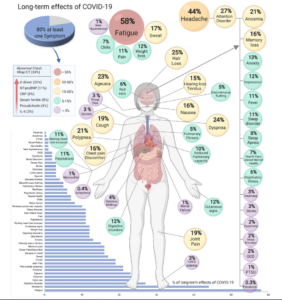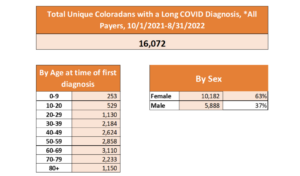Long COVID in Colorado
COVID-19 continues to impact life through physical, mental, and emotional hurdles. A current area of interest is Long COVID, broadly defined as, “symptoms affecting multiple organs which range from cough and shortness of breath to palpitations, chest pain, joint pain, physical limitations, fatigue, depression, headache, and insomnia which affect people of different age groups after COVID-19.” To better prepare for future public health emergencies, incredible investments have been made in research to investigate and better understand Long-COVID and it’s potential impact.
Working with a broad range of shareholders, including the federal government, academic institutions, and patient advocacy groups, the Office of Saving People Money on Health Care (OSPMHC) was tasked with exploring Long COVID, its effect on health systems and facilities, as well as its mental, behavioral, physical, and financial health of Coloradans. A better understanding of the number of Coloradans diagnosed with Long COVID in Colorado would assist with developing recommendations for a proper response by the state.
From October 2021 through August 2022, OSPMHC’s analysis - showed that over 16,000 individuals were diagnosed with long COVID in Colorado - a number which could continue to rise as time goes on. After verifying with several different data sources, OSPMHC concluded that women in Colorado have experience a higher proportion of infection and have been disproportionately affected by Long COVID.
OSPMHC’s detailed report highlights federal initiatives and suggested areas to further study the disease. They note that additional research is needed and currently underway to continue exploring the causes, treatment, management, and the different health and socioeconomic impacts of the condition. Moving forward, the Office plans to continue developing diverse partnerships and provide more in-depth analyses and policy recommendations to help Colorado better respond to Long COVID in the future.


